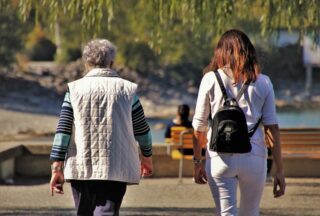Being an unpaid carer can be rewarding but it can also be stressful. Never more so than now.
This week, in the run up to World Mental Health Day on Saturday 10th October, we will be sharing tips, advice and our own mindfulness moments to help you manage your anxiety and take time for yourself on Facebook and Twitter .
The impact of COVID-19
Over the many weeks of lockdown we have spoken to lots of carers who have told us they are struggling more than usual with anxiety and their mental health. For many those anxieties increased once we started easing out of lockdown. Having spent five months shielding their loved ones, they are now having to go outside again, potentially risking catching the virus. And now we are potentially entering a second wave of the virus.
Research from the ONS during April this year*, among those that provided help or support to others outside their home, showed that nearly 1 in 3 (31%) reported symptoms of poor mental health. In 2017 to 2018, that figure was just over 1 in 5 (21%) adults.
Of those caring for someone they live with during COVID crisis, 32% said they were stressed & anxious, 36% were worried about the future, 14% said their mental health was worse**.
Getting started with mindfulness
If you’re looking after someone, it might be hard for you to take time for yourself at all, let alone switch off mentally from the worries or stresses that come with caring for someone.
Mindfulness is one of the great ways of taking care of ourselves. Read our blog on how to get started.
Mindful listening
Have you heard of mindful listening? It’s where you listen to a piece of music with no preconceptions, and just take time to really listen to each element. BBC Sounds has some great mixes to choose from here – why not try listening first thing in the morning to start your day off in a good place, or maybe while you drink your coffee at lunch.
Mindful observation
Mindfulness observation is another great way of incorporating mindfulness into your daily life. Try counting how many colours you can see in nature on a walk, or why not have a look at BBC Springwatch for beautiful snapshots of nature.
Avoiding carer burnout
Looking after someone is no easy feat. Especially in these times, whether you look after someone in your home, or look after someone from a distance, caring for someone can really take a toll on your own health. Read our blog on Carer Burnout and how you can tackle it.
Linda Clarke, Master Hypnotherapist, Personal Coach and NLP Practitioner at The Counselling & Psychotherapy Centre, Swindon has written a blog post for us on how to reduce stress and worrying.
Getting support from others
Sometimes just having a chance to talk about how you’re feeling can really make a difference. Our Talk and Support Service allows you the chance to talk with someone who understands what you’re going through. If this sounds like something you’d benefit from, call us on 0800 181 4118 or email us to register.
Our virtual cafes are also a great way of connecting with other carers and taking time for yourself to relax, socialise and talk to others in similar situations. We’d love to see you there!
Visit our What’s On page to find out more.
Mental health support
Sometimes, how you’re feeling and what you’re going through means you need a bit more support. We’ve collected some great mental health helplines, webchats and websites that can help you or the person you look after with anxiety, stress and low mood. And remember, you can call us on 0800 181 4118 for information, advice, and support.
Visit our mental health helpline resource
It’s OK not to be OK
There is so much pressure to have it all together, especially if you’re looking after someone, you may find it hard to let others know you’re struggling. But it’s okay not to be okay. Read our blog on tips for being kind to yourself.
And don’t forget we are here for you. You can call us on 0800 181 4118 Monday – Thursday 9.30am – 4.30pm, Friday 9.30am – 4.00pm.
*Source: ONS Understanding Society Covid-19 Study, April 2020 and Understanding Society, 2017 to 18
**Source: ONS Opinions and Lifestyle Survey Pooled Dataset, 3rd April 2020-10th May 2020




